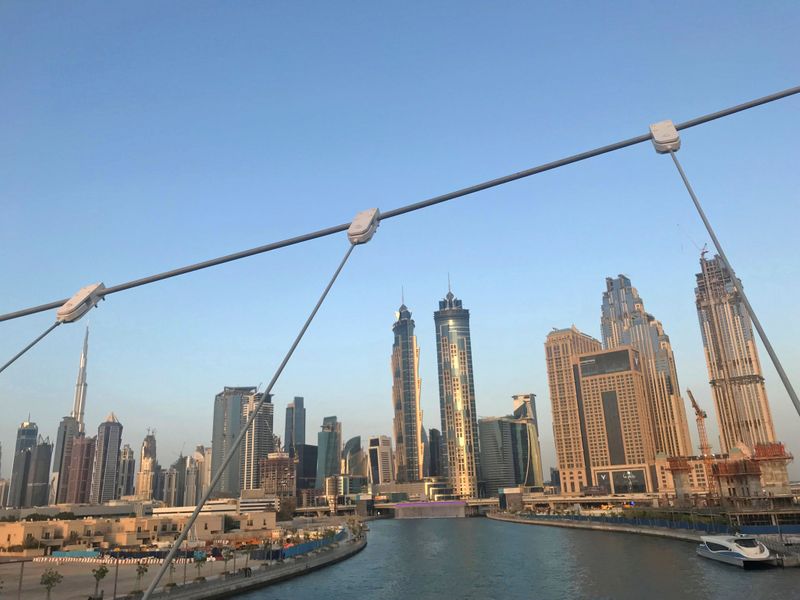
Dubai: The UAE’s economic growth is projected to take a faster route in 2020 driven by rising business optimism, fiscal stimulus and higher government and private sector spending in projects related to Expo 2020 Dubai.
The latest forecasts from international organisations such as the International Monetary Fund (IMF) and the Institute of International Finance (IIF) point to a significant pick up in growth momentum next year.
Recently the IMF revised its growth forecast for the UAE upwards following its Article IV Consultation with UAE authorities. The IMF team, after discussions with the UAE government concluded that the country’s GDP will grow up to 3 per cent next year from a relatively modest growth of slightly above 1 per cent in 2019.
3 %
estimated UAE GDP growth for 2020, according to the IMFThe IIF has also forecast the growth momentum picking up further through 2020.
“We expect non-hydrocarbon real GDP growth to pick up to 1.7 per cent in 2019 and 2.2 per cent in 2020, supported by Abu Dhabi’s three-year stimulus package and Dubai’s spending linked to Expo 2020,” said Garbis Iradian, chief economist, Middle East and North Africa (Mena) of the IIF.
In its latest Regional Economic Outlook (REO) report in October the IMF had given a provisional forecast of 2.5 per cent GDP growth for 2020.
Following the Article IV consultations, the IMF team headed by Koshy Mathai concluded that the economy is on a recovery path and likely to pick up more momentum next year, helped by Expo 2020 and existing fiscal stimulus.
“Following a challenging period, the economy is recovering,” said Mathai. “Non-oil growth could exceed 1 per cent in 2019 and pick up to around 3 per cent next year, the fastest since 2016, on the back of Expo 2020 and fiscal stimulus.”
According to IIF forecasts, Abu Dhabi’s real GDP would grow 2.3 per cent and 2 per cent respectively in 2019 and 2020 while Dubai’s economy is expected to record 2.1 per cent and 2.3 per cent growth respectively over the same period, largely driven by non-oil growth.
The IIF is optimistic on the modest but sustained recovery of the economy, supported by strengthening credit growth and improvement in the banking sector liquidity. However, the IIF warns that the GDP growth could slow beyond 2020 below 2 per cent as the impact of Abu Dhabi stimulus and Expo 2020 fades.
“The downside risks to the outlook include lower oil prices and slower global growth, which weighs on transport, logistics, tourism, and foreign investment,” said Iradian. “The continued decline in housing costs has been a major drag on inflation, and we expect the consumer price inflation to decline by 1.3 per cent in annual average terms in 2019.”

Real estate prices have been falling since late 2014, mainly due to oversupply and weaker consumer sentiment in the context of prolonged low oil prices. Additionally, foreign buyers have been discouraged by the sharp effective appreciation of the dirham in recent years and escalation of geopolitical tensions.
Confidence rising
Various independent studies in recent months have indicated that business confidence in the UAE is on the rise supported by a stable economic outlook in the medium term, as preparations for Expo 2020 Dubai ramp up.
The latest HSBC Navigator: Now, next and how survey of more than 9,100 companies in 35 countries and territories, finds that 83 per cent of the UAE’s businesses anticipate sales growth over the next 12 months — with at least 35 per cent looking to grow by 15 per cent or more.
“The UAE’s significant diversification efforts has meant that the country is increasingly viewed as an innovative hub for trade — benefiting both domestic and international businesses,” said Mike Davis, Head of Commercial Banking, HSBC UAE.
“Vision 2021 combined with the Expo’s international reach and connectivity are driving opportunities for export-minded companies.”
Economic outlook: Stable
The UAE’s economic outlook remains stable, despite a slowing global economy, trade disputes, softer energy demand and heightened geopolitical tensions, according to research published by the National Bank of Kuwait (NBK).
“The medium-term outlook for the UAE remains stable, underpinned by sizeable SWF (sovereign wealth fund) assets and the government commitment to forge ahead with reforms,” said Dr Saade Chami, NBK Group Chief Economist.
The latest Purchasing Managers’ Index showed, despite tough economic environment, business expectations towards future output improved in October. Firms were positive that new strategies and greater investment ahead of Expo 2020 would lead to higher levels of activity.
Ample fiscal space
Although the UAE is expected to have modest fiscal deficits this year and the next, the current accounts are forecast to remain in positive territory.
“The UAE can afford a modestly expansionary fiscal stance over the next few years given its large financial buffers and spare capacity,” said Iradian. The current account surplus, while narrowing, will remain sizeable.”
The country remains the main regional destination of FDI inflows, attracting about $11 billion (Dh40.3 billion) in 2018 (2.9 per cent of GDP). The authorities are seeking even higher FDI inflows, setting a target of 5 per cent of GDP for 2021.
The IIF expects gross public foreign assets (official reserves plus SWFs) of the UAE to increase to $908 billion in 2019 (210 per cent of GDP).
Corporate issuance to refinance existing loans and bonds that mature in 2019 and 2020 will remain sizeable. The IIF estimates maturing loans of Dubai’s government-related-entities’ (GRE’s) in 2021 at $23 billion, to be restructured again.
The IIF observed that the UAE authorities have set clear goals for encouraging diversified and knowledge-based growth and are implementing a broad range of policies to achieve their goals. It said privatising non-strategic GREs and enforcing competition laws and regulations on all entities would improve efficiency and raise productivity.
Challenges
Economists say sustaining robust non-oil growth after Expo 2020 remains a key priority, especially in the context of the likelihood that global oil demand will slow in the face of technological advances as well as policy responses to climate change.
To address the medium term challenges, the IMF team discussed two key policy priorities such as promoting the growth of the non-oil private sector, including small and medium enterprises (SMEs); and strengthening fiscal frameworks to ensure both sufficient saving of oil wealth for future generations and smoothing of short-term fluctuations.
Commending the work already done by the UAE, the IMF team observed that the authorities have already taken a number of important steps, including adopting a foreign direct investment (FDI) law allowing 100 per cent foreign ownership in selected sectors, and reducing or eliminating fees and penalties.
“The [IMF] mission welcomes the authorities’ steps to implement a comprehensive national SME development strategy,” said Mathai.
“Particularly important steps in this area would include lowering start-up costs; operationalising the new insolvency framework; and promoting greater financial inclusion. The mission recommends establishing a single agency responsible for SME promotion, with any possible costs to the budget recorded transparently.”
Fiscal framework
The IMF reiterated its call for establishing medium term fiscal framework rather than short term boosts through government spending.
The team observed that a fiscal framework is needed that enshrines a commitment to savings, which are currently below the level required to preserve wealth for future generations. A balance between short- and long-term objectives, however, is critical, and given current economic conditions, the authorities’ existing stimulus is appropriate.
“The UAE has been coping well to the regional and global economic slowdown,” explained Jihad Azour, the IMF’s Director of the Middle East and Central Asia Department, in late October.
“The government has announced several measures to boost growth by reducing cost of business. Going forward, the UAE should have longer term fiscal plans rather than short term boost in government spending to support growth.”
The IMF team called on UAE authorities to complement the fiscal reforms with better monitoring and analysis of GRE-related contingent liabilities.
Welcoming the fiscal policy measures already taken by UAE authorities, the IMF mission observed that frameworks should be centred around long-term fiscal anchors, while allowing the flexibility to smooth short-run oil price fluctuations as well as the non-oil business cycle.












